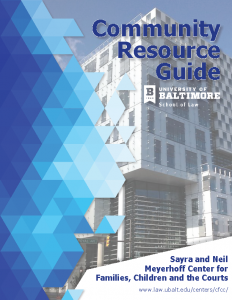
Spencer Hall, CFCC TCP Attorney
By Spencer Hall, CFCC TCP Attorney
For the past nine years, first as a CFCC Student Fellow at the University of Baltimore School of Law, then as a staff member for CFCC’s Truancy Court Program, I have seen firsthand the many challenges faced by our community’s most vulnerable families and the impact that exclusionary school discipline practices can have on a student’s ability to succeed. The Truancy Court Program takes a holistic approach to combating truancy and helping students to thrive in school. In my current role as TCP Attorney, I work directly with students and families, directing them to resources and empowering them to be advocates for themselves and their families. In this article, I offer a brief overview of some of the key rights that parents should be aware of related to school discipline.
Why it’s important to know your rights around school discipline:
A suspension or expulsion can have lasting and devastating impacts on a child’s academic progress, and ultimately, their future. We also know that Black students and students with disabilities are far more likely to be suspended or expelled than other students. A 2018 study by the Maryland Equity Project found that nearly 60% of out-of-school suspensions in Maryland were of Black students, despite the fact that Black students make up only 35% of the state’s public school enrollment. The suspension rate for Black students was twice that of white students. The study also found that students with disabilities represent 13% of Maryland’s public school population but account for nearly 25% of out-of-school suspensions.
When faced with a suspension or expulsion, it is critical for students and parents to understand their legal rights.
Here are 5 important things for parents to know about the suspension/expulsion process:
- Pre-K, kindergarten and first and second grade students may not be suspended or expelled, except in very limited circumstances.
This one may come as a surprise to parents because it is a relatively new right. In 2017, the Maryland General Assembly passed a law to ensure that the state’s youngest children can only be suspended or expelled in the most extreme situations, where there is an “imminent threat of harm” to other students or school staff.
-
- A student cannot be suspended for minor infractions.
Many families are unaware that students cannot legally be suspended for minor infractions such as tardiness, cutting class or being out of uniform. The TCP has worked in schools where staff routinely turn students away at the door for being out of uniform. This practice is not only unfair, it is a violation of the student’s right to an education.
-
- Only the principal has the authority to suspend or expel a student.
Teachers may send students to the principal or other administrator, but teachers and other school staff do not have the authority to send a student home. Only the school principal may suspend a student, and the suspension cannot last longer than 10 days. If the principal believes that a student’s behavior warrants a suspension of more than 10 days or an expulsion from the school, the principal must make the request in writing to leadership at the district level.
-
- The school must provide a letter explaining the reason for the suspension.
Any time a student is suspended, the principal must provide a letter stating the reason for the suspension and the date on which the student is allowed to return to school. On the anticipated return date, the school must hold a meeting with the student and a parent or caregiver. Over the years, the TCP Team has heard countless stories from students who were told to leave the school without the proper paperwork. School staff may send a student home in this way to save time, to avoid having to report the suspension to the district, or simply because staff are not aware of the legal rights and requirements that govern suspensions.
-
- Students who are suspended have a right to make up any missed work.
Under Maryland law, any student who receives a suspension of 10 days or less must be allowed to complete any missed assignments without penalty. If a student is suspended for more than 10 days or expelled from their school, the school district must provide an appropriate alternative educational program (e.g., transfer to a different school or GED program) or provide the student with work to complete at home.
Where can families get help in appealing a suspension or expulsion?
The suspension and expulsion process can move very quickly, and the appeal process varies by district. If you need help advocating for your child in a disciplinary action, contact the Maryland Suspension Representation Project as soon as possible.
Learn More
If you would like to learn more about families’ rights around school discipline, view the CFCC Webinar – Know Your Rights: School Discipline, Suspensions and Expulsions, Special Education, hosted by CFCC Executive Director Rebecca Stahl. As co-panelist, I discuss the legal rights of students and families when faced with disciplinary action, and Megan Berger, Assistant Managing Attorney at Disability Rights Maryland, spoke to the disproportionate impact on students with disabilities and additional legal protections in place for students who receive special education services. Registered participants submitted questions for the panelists during the Zoom session.

A Community Resource Guide from CFCC
CFCC believes that one simple way to prevent child welfare intervention is to make it easy for families to access the services they need, so we are creating a series of Community Resource Guides. New issue-focused guides will be published on a regular basis. Two new guides this month – Homelessness & Housing Services and Legal Services.